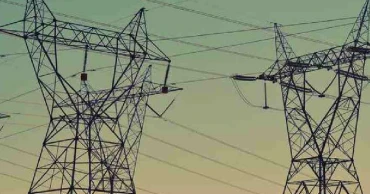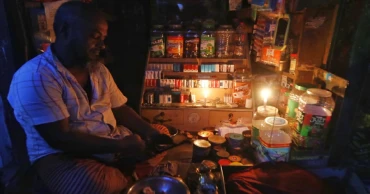DPDC
City power disruption hits key Dhaka areas
Several areas in Dhaka city experienced power outages on Saturday night following an electrical malfunction at a Power Grid Company of Bangladesh (PGCB) substation in Rampura.
The disruption began around 10 pm, according to Bangladesh Power Development Board (BPDB) spokesperson Shamim Hasan.
He said the malfunction primarily affected areas under the Dhaka Power Distribution Company (DPDC), while zones served by the Dhaka Electric Supply Company (DESCO) remained mostly unaffected.
As a result, electricity supply was cut off in Rampura, Hatirjheel, Farmgate, Banani and Gulshan.
PGCB personnel are working to resolve the issue, the spokesperson said.
When asked about the estimated restoration time, he said, “It could take half an hour to an hour, or possibly longer.”
“Arrangements will be made to restore power, even if it requires bypassing the affected area,” he added.
8 months ago
No headway in taking Dhaka’s internet, satellite TV overhead cables underground
Despite repeated efforts by the Power Division, no progress has been made in bringing the distressing overhead internet and satellite TV cables underground although power utilities are implementing their project in this regard.
It has even not possible to make the operators of internet and satellite TV cables agreed to join the ongoing underground cabling projects of the power utility bodies.
According to official sources, Dhaka Power Distribution Company Limited (DPDC) has been implementing its first project in the Dhanmondi area to take its all overhead transmission lines underground.
“But despite repeated calls by the DPDC, no internet or TV cable operator agreed to join the project. They were even offered free of cost to join the scheme. But no response was received,” a top official of the Power Division told UNB.
In such a frustrating situation, recently the Power Division reconstituted its previous committee and also convened a meeting to find a solution to it. But finally the meeting was not held for unknown reasons.
Dhaka’s air quality 3rd worst in the world this morning
Member secretary of the reconstituted committee and director of the Power Cell Md. Salim Ullah Khan informed that the power Division’s efforts will continue.
“But the other departments and agencies are not interested in cooperating with the Power Division’s efforts in this regard,” he told UNB.
Sources at the Power Division blamed the Nationwide Telecommunication Transmission Network (NTTN) and internet service providers (ISPs) for the horrible situation of the overhead cables.
After a number of meetings, the previous committee of the Power Division found it difficult to address the problem without their cooperation.
According to its report submitted to Power Division, Summit Communications Limited (SCL) and Fiber@Home (FAH) have been working as NTTN in the city and they laid underground cables for operating their main internet network in the city while some 1734 legal and some 5,000 illegal internet service providing (ISP) companies have been operating as local ones to provide internet connections to homes and offices through overhead cables.
As per the system, the ISPs are supposed to take connections from SCL and FAH to take internet service to homes and offices from the main network. Recently, Bahon Limited, another NTTN company, also joined the network.
But NTTN companies alleged that the ISPs are not taking connections from Label Distribution Protocol (LDP) or Access Point (AP) installed by NTTN as it will cost them financially, says the report.
Rains likely in parts of Dhaka, 7 other divisions
On the other hand, the report reveals, the IPS companies alleged that they do not prefer taking connections from LDP or AP as they do not get required and instant solutions from the NTTN companies if any problem takes place in any internet service connection.
Besides, the NTTN are charging excessively in providing connections to the ISP companies from their LDP and AP, the report mentions quoting the ISP companies.
Under the circumstances, the ISP companies are hanging overhead cables indiscriminately and giving connections to homes and offices without following any rule or regulation, the report says, adding that only the Bangladesh Telecommunication Regulatory Commission (BTRC) can step in and resolve the conflict.
Finally, the committee adopted an 11-point recommendation to have a solution and take all overhead cables underground through coordination with electricity distribution companies —DPDC and Desco.
The committee found that the haphazardly hanged internet, security and satellite TV cables are not only posing a great threat to the power distribution system, but also creating a major obstacle to the government’s move for the beautification of the capital.
Rashed Amin Biduyt, an official of the Bahon Limited, said they are not joining the DPDC underground cabling project due to technical reasons as it will not fulfill its requirements to facilitate connections to ISPN.
"But we're laying our own cables underground with the permission of the South City Corporation," he said.
Read more: Installation of underground cables completed in Hatirjheel area
1 year ago
Installation of underground cables completed in Hatirjheel area
The work to install underground cables has been completed in Hatirjheel area, although subsequent road repairs necessitated by the project are progressing slowly.
According to official sources, both the Power Grid Company of Bangladesh (PGCB) and Dhaka Power Distribution Company Ltd (DPDC) completed their work in September and deposited their required money to the Rajdhani Unnayan Kartripakkha (Rajuk) to repair the roads as per rule.
Sources said that recently a Rajuk-appointed contractor has started the road repair works but it’s going on at a very slow pace.
The DPDC and PGCB have laid the high voltage underground cables through digging the roads in the area to replace their overhead cables at the Hatirjheel lake.
The DPDC first completed its part of the work in June, and then the PGCB’s work was completed in September, said the sources in the PGCB. PGCB officials said after completion of the works, the Rajuk will repair the roads as the area is under its jurisdiction.
Underground power cabling works at Hatirjheel: Commuters’ ordeal unlikely to end soon
2 years ago
Radical change in power system network in Dhaka city and beyond expected by end 2024: Chinese official
A radical change will take place in the power system of Dhaka city and its adjacent Narayanganj after the full implementation of the project titled "Expansion and Strengthening of Power System Network" which will be the main foundation of digital Dhaka city, says a senior Chinese official.
"Over 70 percent work of the project has so far been completed," Director, International Market Management of TBEA's Ma told UNB.
He said the whole project will be completed and delivered to Dhaka Power Distribution Company Limited (DPDC) by the end of 2024.
Banshkhali-Meghnaghat 400 kV power transmission line comes into operation
Director Ma said TBEA is working under a US$1.65 billion project under which several subprojects are being implemented.
The project is the largest power cooperation project between the two governments of Bangladesh and China since the establishment of diplomatic ties between the two countries.
The implementation of the project will enable the power grid system to be of better quality and serve the government departments and people of Bangladesh, and better promote the social and economic development of Bangladesh, said the Chinese side.
Shielding capital Dhaka from loadshedding masks reality of power cuts biting nation
TBEA, an international service provider of system solutions for global energy industry, dedicated to green and low-carbon development, with more than 24,000 employees from 24 countries, sees this project under the "Belt and Road Initiative" cooperation and development between China and Bangladesh.
2 years ago
Overhead transmission lines in Hatirjheel going underground as part of DPDC’s megaplan
Dhaka Power Distribution Company Ltd (DPDC) has finally started the work to lay underground cables that will replace the high voltage overhead transmission lines in Hatirjheel area.
“We’ve already laid 2.2km of 132 kilovolt (kV) underground cables, out of a total length of 3.5 km. We hope, by next year people will not see any overhead cables in Hatirjheel,” Bikash Dewan, managing director of DPDC, told UNB.
He informed that the cables are being laid underground through digging the roads in southern part of the Hatirjheel area and cables reach the Mogbazar through Rampura Bridge area.
The Hatirjheel Lake was artificially created in a vast area of Gulshan, Tejgaon and Rampura as part of the city's beautification and environmental protection plan. But the overhead cables were out of place with the plan.
Read more: Dhaka alone experiencing over 600 MW of load shedding during daytime
Removing overhead cables from Hatirjheel is a part of the DPDC’s larger plan to take all its overhead cables underground from different areas in the city’s central, west and southern parts.
The DPDC undertook a “Power Distribution System Upgrading Project” to improve its network and system in its command area in Dhaka city and signed a contract with the Chinese contractor TBEA in September in 2019 to implement the China-funded Tk 20,500 crore mega project.
DPDC officials said that earlier they completed the design of the project in which a total of 190 kms of overhead electricity cables will be removed and taken underground from different areas in the city.
Of these, about 115 kms are of 11 kV overhead lines, and 75 kms are 0.4 kV lines, they said, adding that all kinds of overhead electric cables will go underground and no cable will remain visible in a particular part of Dhanmondi area that includes Satmasjid Road, Mirpur Road, City College and Greenherald School area.
Read more: Coordination demanded in underground cabling of electricity, internet lines
Under the project, 40 substations will be set up in the city and cables in Dhanmondi residential areas will be laid underground.
Taking overhead cables underground from Jahangir Gate in Cantonment to Motijheel is also included in DPDC’s other similar project which was already completed.
“Of the areas, implementation work of the project in Dhanmondi area is in progress,” said Bikash Dewan, addingwork will be started gradually in many more areas.
DPDC officials said the equipment for the project has already arrived from abroad. Under the project in the Dhanmondi area, pole-mounted transformers are being replaced with box-type transformers.
Read more: Overhead electricity cables to go underground in major cities: Nasrul Hamid
Some 36 box-type transformers, 296 of 6-way ring main units (RMU), 34 of 3-way RMUs and 130 LV Cabinet will be installed to facilitate the underground cabling system, they informed.
They said the project was supposed to kick off in January 2020. But the Chinese engineers who were responsible for designing the works got stuck in their hometown Wuhan following the outbreak of Covid-19 pandemic.
Officials said most of the materials, equipment and system were brought to the country for the Dhanmondi pilot project.
Bikash Dewan said once the project is implemented, it will play a vital role in improving the power distribution system and substantially check the unexpected interruption in power supply.
Read more: DPDC blames delay in launching Dhanmondi underground cable project on DSCC, hails DNCC cooperation
2 years ago
Dhaka alone experiencing over 600 MW of load shedding during daytime
Dhaka has alone been experiencing more than 600 MW of load shedding during daytime when demand for electricity remains relatively low than nighttime.
According to official sources, like the previous few days the country has been seeing over 2000 MW of power shortage.
As a result, consumers across the country are facing power outages for 6 to 7 hours in different spells during the day.
Also Read: After record, country’s power generation again drops below 15,000 MW
“After the evening, the situation will be deteriorating with the increase in demand,” said a top official of the Bangladesh Power Development Board (BPDB) preferring anonymity.
He attributed the gas shortage for the severe situation in power supply.
“Actually, we have been getting lower supply of gas that forced us to keep at least 25 generation units across the country shut,” he said.
Also Read: Load shedding in Sylhet: PDB engineer receives threat; GD filed
He, however, said that if the BPDB receives normal supply of gas, it can produce 6,500 MW of electricity from its gas-fired plants.
“But now we’re producing 4667 MW and about 1,833 MW of electricity is not available for gas shortage,” he noted.
Meanwhile, managing director Dhaka Electric Supply Company (Desco) Md. Kausar Ameer Ali said that the area under the organization was experiencing a load shedding of 308 MW in the daytime.
Read more: Gap between power generation, supply widening: Nationwide load shedding over 1500 MW
“The Desco is receiving about 800 MW against a demand of 1111 MW,” he told UNB.
Desco is entrusted with the responsibility to distribute electricity in Dhaka city’s north, north-west and eastern parts while Dhaka Power Distribution Company (DPDC) is responsible for power supply in the south, southeast and central part of Dhaka city.
DPDC Managing director Bikash Dewan said that area under DPDC has been experiencing a shortage of about 340 MW which might be up after the evening.
Also Read:Load shedding in Sylhet: PDB engineer receives threat; GD filed
He said DPDC has been resorting to load shedding of more than 340 MW to manage a demand of more than 1600 MW as it has been receiving 1250 MW.
However, consumers are complaining that they have to experience a huge load shedding.
In some areas, people are allegedly experiencing power outages just in every alternative hour.
Also Read: Load shedding amid intense heat wave makes life miserable in Khulna
“Power cuts are frequent and we have been experiencing load shedding in every alternative hour,” said Abdus Selim, a resident in the city’s Niketan area.
The same experience was shared by Nazim Uddin who lives in Moghbazar area.
State Minister for Power, Energy and Mineral Resources Nasrul Hamid on Sunday said that it will take two days to improve the power and gas supply situation in the country.
Also Read: Loadshedding becomes insufferable: Locals vandalise Palli Bidyut office in Feni
He said that after the suspension of gas supply from two floating LNG terminals, one terminal left its place for safe location while another one remained stationed at its own location.
The suspension caused a huge shortage in gas supply that triggered the current level of load shedding across the country.
“The current disruption in power and gas supply will improve as one of the two LNG terminals will resume supply within two days,” he told reporters at his office in the ministry.
Also Read: Record heat driving record power generation, even as loadshedding increases
“But I hope, gas supply will resume from one terminal within two days which will improve the situation with the supply of 400 mmcfd gas,” he said, adding that it will take 10-12 days to resume gas supply from the other LNG terminal.
2 years ago
Aminbazar-Agargaon grid line failure: No electricity in Mohammadpur, Mirpur areas
The 230 kV grid line from Aminbazar-Agargaon failed at 5:50 am today (February 21, 2023)— leading to no electricity in the western part of Dhaka city, including the entire Mohammadpur and Mirpur areas.
Officials from both Power Grid Company of Bangladesh (PGCB) and Dhaka Power Distribution Company Limited (DPDC) confirmed the development.
“The grid transmission line tripped at 5:50 am,” Badruddoza Sumon, Public Relation Officer of the PGCB told UNB.
Further explaining, he said due to the dense fog, sometimes grid lines can break down.
Also Read: National power grid failure: Blackout across Bangladesh
This is not a technical fault of the system, he added.
He informed that the PGCB engineers are trying hard to restore the system by checking transmission towers.
Aminbazar-Mohammadpur grid line is one of the main sources supplying electricity to some of Dhaka city’s important establishments, including the Prime Minister’s official residence and Dhaka cantonment.
Power supply continued through alternative sources to those important establishments although regular consumers are without electricity.
Read More: Committee to review existing deals on coal purchase for power generation
Maniruzzaman, executive engineer of the Mohammadpur power distribution division of the DPDC, said power supply could not be restored until 9 am.
3 years ago
Cyclone Sitrang: Many areas in Dhaka, Narayanganj plunge into darkness following disruption in power supply
Many areas in Dhaka and Narayanganj cities plunged into darkness following a huge disruption in power supply that authorities blamed on the approaching Cyclone Sitrang.
According to officials of the Dhaka Power Distribution Company Limited (DPDC) and Desco, the two entities which control the distribution network in Dhaka and Narayanganj, following a fault in Sympur, Ulan and Maniknagar grid line, many areas experienced blackouts for hours.
“Due to the grid-disruption, power supply went off in Dhanmondi, Sher-e-Banglanagar, Kakrail, and Kajla in Dhaka city and also some areas in Narayanganj city," Bikash Dewan, managing director of DPDC, told UNB.
Read Cyclone Sitrang weakens into depression
He said many areas also experienced blackouts due to the collapse of trees on the power distribution lines due to cyclone Sitrang.
Some 32 teams of DPDC have been working to restore supply in the disrupted areas, he added.
He also said that power supply came down to 700 MW from 1,400 MW following the disruption in some grid lines in DPDC areas.
As a result, consumers have been experiencing loadshedding despite relatively cool weather, he said.
Read Cyclone Sitrang: Educational institutions in 3 divisions declared closed
Desco managing director Kausar Ameer Ali noted that power supply was disrupted in Uttara, Gulshan and Mirpur areas.
“Mainly falling of trees and flying construction materials and other objects over the distribution lines led to the disruption in Desco areas,” he noted.
A good number of Desco teams are working to fix the problems and restore power supply, he added, saying consumers in his area have been experiencing loadshedding since evening due to lower supply against the demand.
Read 110 evacuated from isolated char in Bhola ahead of Sitrang landfall
3 years ago
Some Dhaka areas to have up to 8hr load shedding today
Residents of some Dhaka areas will experience power cuts for up to eight hours today (October 17, 2022). Dhaka Electric Supply Company Limited (DESCO) has published the new schedule for load shedding on Monday.
DESCO areas include Uttara, Gulshan, Baridhara, Bashundhara, Banani, Badda, Uttarkhan, Dakkhinkhan, Agargaon, Mirpur, Kafrul, Kalyanpur, Khilkhet, Pallabi, Rupnagar and Tongi.
Consumers under Dhaka Power Supply Company Limited (DPDC) will see power cuts for 4-6 hours.
Read: PGCB names 2 suspended officials for power grid failure
The load shedding schedules can be found on the DPDC and Desco websites.
On October 11, State Minister for Power, Energy and Mineral Resources Nasrul Hamid urged people to be patient during the ongoing power crisis that has triggered 5-6 hour long daily load shedding in and outside Dhaka city.
He said the people have to wait until November for power supply situation to improve.
Read: Power supply in Dhaka: Until Ghorashal working in full capacity, situation won’t improve
Prime Minister’s Energy Advisor Dr Tawfiq-e-Elahi Chowdhury yesterday said there is no immediate solution to the ongoing load shedding in Dhaka, as the government has reduced import of primary fuel to conserve foreign currency reserve.
3 years ago
Despite lower electricity demand on weekend, Dhaka residents suffer
During the weekend on Friday and Saturday when consumers expect an uninterrupted power supply against a lower electricity demand they had no luck this time.
Power cuts on Friday were like a usual working day when demand for electricity soars as offices and businesses operate.
Official figures show, though the situation has improved to a certain level following the restoration of power supply across the country after a 7-hour national grid failure on October 4, still the power generation could not reach the previous level.
Read Saving electricity: Bangladesh Bank issues notice to close evening banking
According to officials, Dhaka city and adjoining areas experienced more than 500 MW of power shortages daily against a demand of 2500 MW on Friday and Saturday.
Officials of both Dhaka Power Distribution Company Limited (DPDC) and Dhaka Electric Supply Company Limited (Desco), which distribute electricity to Dhaka city and surrounding areas admitted that the power supply situation have deteriorated in recent days and now they have to resort to load shedding for more than 3 hours a day.
However, residents in both Desco and DPDC areas alleged that they have been experiencing power cuts for 3-6 hours a day.
read Focus more on generating electricity from renewable sources: Nasrul Hamid
" We have been experiencing more than 5 hours of load shedding on a number of occasions”, said Abdur Rahman Jahangir, a resident of Rampura area.
Similar allegations are being received from the residents of other areas under both DPDC and Desco.
DPDC is managing power supply with 300 MW of less electricity in the daytime and the outage level might go up further in the night, said Bikash Dewan, managing director of the company.
Read Bangladesh to sign PPA with Indian companies to purchase 500 MW electricity from Nepal
DPDC is responsible for power distribution to the central and west and south-west part of Dhaka city and parts of Narayanganj.
“We’ve to struggle with the relatively lower supply from the BPDB for DPDC areas where most key point installations (KPIs) including official residences of the President and the Prime Minister, cantonments and most public hospitals are located”, he told UNB.
DPDC received 1,100 MW at 7 am on Saturday against a demand of 1400 MW while the demand remains between 1650 and 1700 MW on a working day, he noted. The situation was almost similar on Friday as well.
Read National grid failure: Power Division forms 7-member probe body
Md. Kausar Ameer Ali, managing director of Desco, which distributes power to the north and east parts of Dhaka city and Tongi industrial hub, said that the distribution entity is receiving 750 MW of electricity against a demand for 932 with a load shedding of 182 MW.
"In the evening, the extent of load shedding might increase in Desco areas”, he told UNB.
A top official of the Bangladesh Power Development Board (BPDB), quoting official data, said that the country’s highest power generation was 12,889 MW on Friday against a relatively lower demand of 13,900 MW while load shedding was recorded to be 1011 MW.
Read Power blackout triggers chaos in Dhaka petrol pumps
According to him, who preferred not to be named, the highest demand forecast for Saturday is 13,600 MW while generation forecast is 12,435 MW and load shedding is expected to be 1,165 MW across the country.
The country’s total power generation capacity is about 25,500 MW. But as part of austerity measures, the government kept all the diesel-fired plants closed while a good number of plants remained out of operation for a shortage in gas supply.
The official also admitted that the official figures sometimes do not rightly reflect the actual deficit in power supply as the figure is made based on the generation amount recorded at the power stations’ end.
Read National power grid failure: Blackout across Bangladesh
“But when the electricity reaches consumers’ end, automatically 10-13 percent of electricity is lost in the system itself as there are their own consumptions by the power stations, substations and transmission systems”, he said.
So, people usually get 10-13 percent less electricity than the figure shows, he said.
Meanwhile, officials of the BPDB informed that the still Ghorashal power station was not able to resume generation in full swing.
Read RMG factories bearing power outages of 4 to 10 hours a day: BGMEA President
The power station is generating a total 210 MW against a capacity of 700 MW as still 6 generation units, out of total 7, could not come back into generation, he said adding, the situation will improve in Dhaka when the remaining 6 units, having about a capacity of 500 MW, could add to the generation.
3 years ago



















